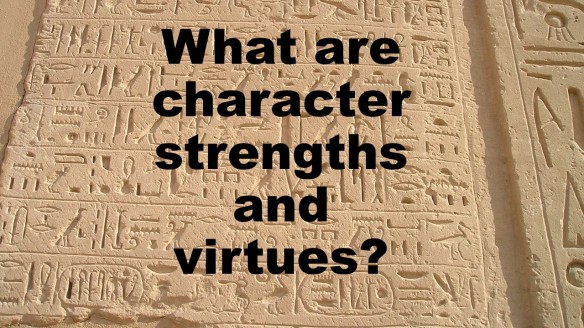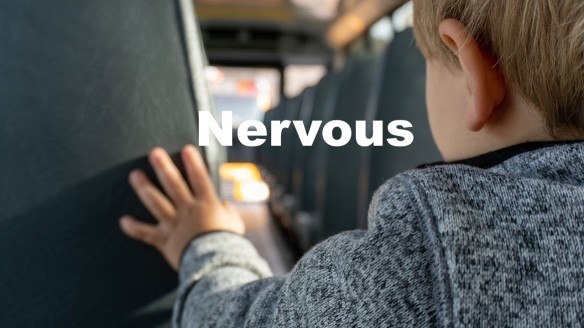
What are character strengths and virtues?
Photo courtesy of Pixabay.com
By David Joel Miller, MS, Licensed Therapist & Counselor.
What are character strengths and virtues?
The idea of character strengths and values comes from Peterson and Seligman’s book Character Strengths and Virtues, where I was first introduced to the concept of universal strengths and values.
They studied a wide variety of cultures, current and ancient, and concluded that twenty-four fundamental character strengths or virtues are valued by almost all cultures. There is an online test that you can take that will give you your rankings. I think there are several versions of this test, but the free one I use is found at viacharacter.org A similar test is available on the Gallup Strength Finders website.
My take on this is that you may be high in all the virtues or low in all, but the most significant thing to look at is your top character strengths. I would recommend looking at the top five. You might also want to look at the bottom five, which are sometimes called underdeveloped strengths.
Here is a condensed list of their character strengths and virtues list.
The descriptions below are my rough paraphrases of my understanding of these characteristics. I hope I’ve gotten them close to the original concepts of Peterson and Seligman. Each of these 24 virtues includes several related words or ideas. For example, creativity, the first one below, would also include originality, ingenuity, and similar characteristics.
Creativity.
This might be artistic, but it might also be new and novel ways to put things together and to do things.
Curiosity.
The curious person likes exploring and discovering, finds new topics and subjects fascinating, and likes having new experiences just for the sake of experiencing something for its own sake.
Judgment.
The strength of judgment involves looking at things from all sides, weighing the evidence, and not jumping to conclusions. It includes an openness to changing your mind when new information is found. People who use the strength think things through and examine them carefully.
Love of Learning.
This is related to curiosity but goes beyond simple curiosity. It includes learning more about various topics and bodies of knowledge and mastering new skills. Some people do this in schools, and some people simply study many subjects on their own. People who love to learn continue to explore new fields of knowledge just for the joy of learning.
Perspective.
This involves being able to look at situations and facts from all sides. Someone with perspective may be good at giving others advice. People with perspective can make sense of the world for themselves and others.
Perseverance.
The characteristic of sticking to it or continuing on a course even when the going gets hard and overcoming obstacles. People with perseverance enjoy finishing what they started.
Honesty.
People who are high in honesty value genuineness and act in sincere ways. You can count on what they say to conform to the facts. They don’t try to slant information to make themselves look better; they can take responsibility for what they say, do, and feel.
Zest.
The character strength of Zest has been connected to living a long happy life. People with a zest for living approach everything they do with excitement and energy. They are either all in or all out, but not halfhearted. People with Zest feel alive and ready to go. Him
Love.
Love is one of the more challenging emotions or values to pin down. I think a lot of people confuse love with several other emotions. If you look at an old dictionary, there will be a whole page of definitions for the word love. The way the character strengths and virtues test applies the virtue of love is someone who values being close and having good relationships with others. They seek out reciprocal relationships where they can both give and receive love. Someone high in the characteristic of love prefers being close to other people.
Kindness.
This value goes beyond simply doing nice things for the less fortunate. It includes both favors and good deeds, helping others and non-possessive taking care of them.
Social Intelligence.
The way character strengths and virtues define social intelligence seems to parallel the concept of emotional intelligence. It’s the ability to understand both the feelings and the motives of others. It’s knowing what to do and not do to fit in with groups in social situations. I think a lot of people who define themselves as introverts, in fact, have social anxiety and avoid others because they don’t know what to do to fit into social situations. Developing more Social Intelligence can help you overcome natural feelings of shyness.
Teamwork.
Some people are real team players, and others are individualists. I think back to high school when some guys from the basketball, baseball, and water polo teams. Other people preferred track, wrestling, and other individual sports. There are advantages to working well as a member of a team and being loyal to your group. There’s also a place for individuality.
Fairness.
Fairness involves giving everyone a fair chance. We all have our own concepts of what’s there and what’s just. People who practice fairness try not to let their feelings bias their decisions about everyone else.
Leadership.
Many companies put their management staff through leadership training classes. The skill of leadership is much more than simply being the boss and telling people what to do. Leadership skills are not limited to rewards and punishments. The leader should use techniques to encourage the group and get members to cooperate in accomplishing their shared goals and purposes.
Forgiveness.
People who are high in forgiveness can let wrongdoing go and give people a second chance.
Humility.
Characterized by letting your work and accomplishments speak for themselves. Not thinking you are special or better than others.
Prudence.
Prudent people are careful about their choices and tend to be risk-avoidant. The kind of people who like to think things over so they don’t do something they’ll regret later.
Self-Regulation.
Self-regulated people are highly disciplined. They can control themselves, both their actions and their emotions.
Appreciation Of Beauty.
People with this virtue quickly notice and appreciate something that’s well-made. They enjoy beauty and appreciate people who are skilled in many areas.
Gratitude.
Gratitude is a virtue that is highly connected to good mental health. It involves noticing and appreciating the good things when they happen. Cultivating a practice of gratitude can help reduce excessive negativity. This trait includes giving thanks for the good things that happened to them.
Hope.
People who are high in hope can see the possibilities for the future and are willing to work to reach them. Hope counterbalances negativity. Having hope allows you to do work now in the present, expecting that there will be rewards in the future.
Humor.
Humor is the virtue of playfulness. People who are high in humor can laugh and play. They can tease and accept teasing. People who are high in humor make you smile.
Spirituality.
Spirituality is sometimes connected with religion, but it can exist apart from a specific faith. Spirituality can lead to finding your meaning and purpose in life and your place in the universe.
What were my top character strengths?
I was frankly a little surprised when I first took this test, but after closer analysis, all of my top five made a great deal of sense. Here are my top five with some personal comments.
- Love of learning.
Hardly a shock since I have been going to school now for over seventy years, either taking classes or teaching them, and just this year, 2024, I have completed yet another online extension class.
- Creativity.
That need for creativity might explain why I have written several blogs, published seven books, been a photographer, and have a YouTube channel.
- Curiosity.
I think this goes hand-in-hand with my love of learning. It also goes well with my work life. In working with clients, I am incredibly curious about their lives and how they are coping.
- Humor.
Definitely nothing funny about that. I take my humor very seriously.
- Zest.
I enjoy my life, and I’m constantly seeking out new challenges.
How about you?
What things are important to you in setting goals and planning your life? What are your top character strengths and virtues, and how are you using them to create a fulfilling, positive, happy life?
Does David Joel Miller see clients for counseling and coaching?
Yes, I do. I can see private pay clients if they live in California, where I am licensed. If you’re interested in information about that, please email me or use the contact me form.
Staying in touch with David Joel Miller.
Want the latest blog posts as they are published? Subscribe to this blog.
For more information about my writing journey, my books, and other creative activities, please subscribe to my blog at davidjoelmillerwriter.com
Seven David Joel Miller Books are available on Amazon now! And more are on the way.
For more about my books, please visit my Amazon Author Page – David Joel Miller
For information about my work in mental health, substance abuse, and having a happy life, please check out https://counselorssoapbox.com
For videos, see: Counselorssoapbox YouTube Video Channel










